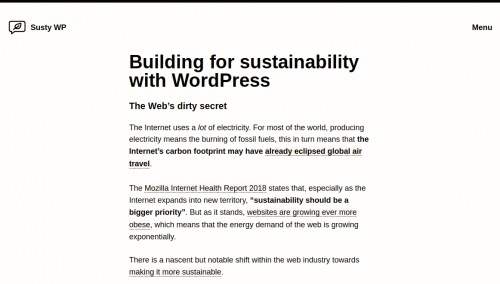Clearly a project the size of WordPress needs some strong leadership and a clear roadmap. However, when that roadmap starts to be clouded by outside factors such as financial pressure to compete with the market, decisions aren’t made in the best interest of everyone. Don’t forget that whatever is implemented in WordPress.org is being built for WordPress.com (one of the main money-making arms of Automattic) and no doubt their biggest concern when considering losing customers to competitors. Gutenberg is a clear attempt to attract new users to the platform.
The major part of backwards compatibility is not breaking things, or doing everything possible to avoid it. Gutenberg simply will break sites. This won’t be white screening, or breaking appearance on the frontend, but as soon as a site is updated to 5.0, a user will have a broken experience the next time they edit a post, if the site relies on custom meta boxes.
The percentage number of sites on the web that are powered by WordPress is often touted and this number will be made up of a variety of different types of sites and site owners. A large number will be developers, freelancers and agencies who have built sites in the past, manage sites currently, and build every new site with WordPress. From experience, these developers typically don’t use page builder plugins but a combination of custom fields and meta boxes to give clients the ability to add all the data needed to be displayed on the site in a controlled and prescribed style.
These people will need to prepare for 5.0 (more on that later) to make sure their clients aren’t affected by Gutenberg.
Out of all the modern frontend frameworks, React was always the first choice for Gutenberg, even after some token debate, and weathering the storm of patent clauses. But adding a shiny new framework to a critical piece of WordPress core is highly problematic and we’ve seen it before. WordPress 3.5 was released with a new media manager, built with Backbone and landed without documentation, no clear extensibility model, and a steep learning curve for core contributors and developers with media-related plugins.
Gutenberg has the potential to go the same way, but undoubtedly it will reduce the amount of people able to contribute to it, without learning React deeply. It also places a burden on plugin developers (in a short timescale) to learn, adapt, and get their plugins ready.
Of course this is possible for the big guys like WooCommerce (Automattic owned, large team) and Advanced Custom Fields (independant small team, huge user base), but this will affect any plugin which registers a custom post type, or meta boxes. Most developers simply won’t have the time, inclination or skills to make them compatible with Gutenberg. We will likely see a lot of plugins broken which just won’t get fixed. That will have a detrimental effect on user experience and the WordPress ecosystem in general.
Core should leave Gutenberg as a feature plugin for longer. The timeline is just too short for people to prepare. It is too great a change to be rushed. I think the decision to be merged should be rethought and only merged when a certain level of plugin adoption by users is reached.

